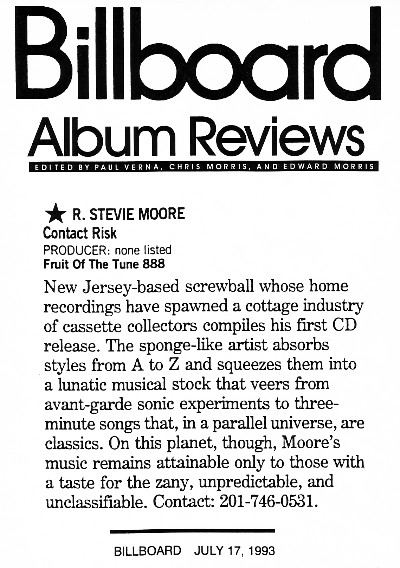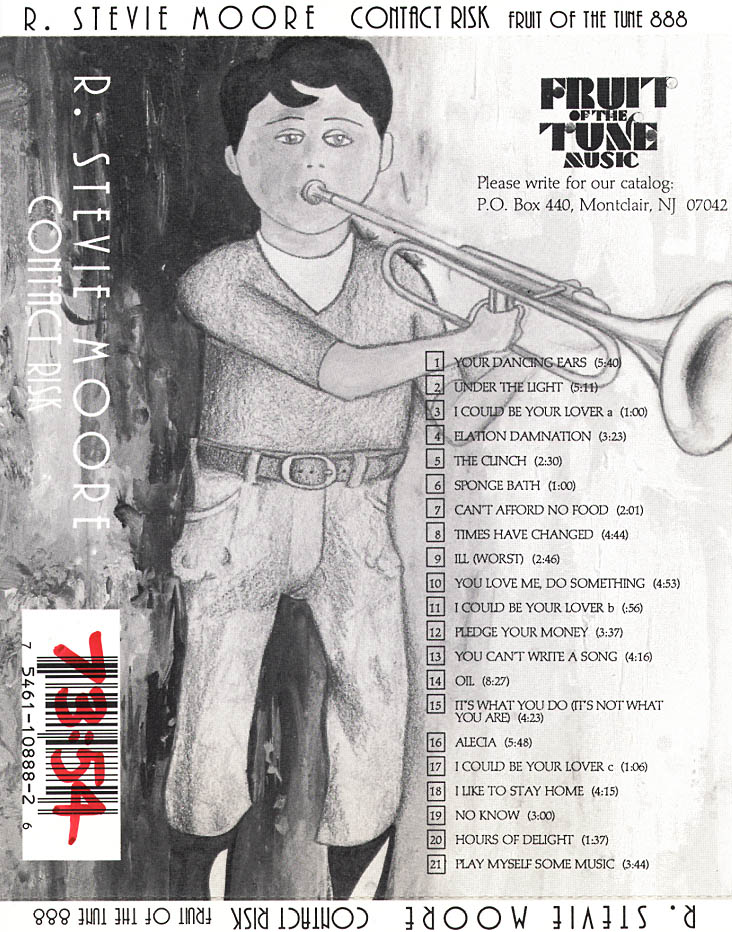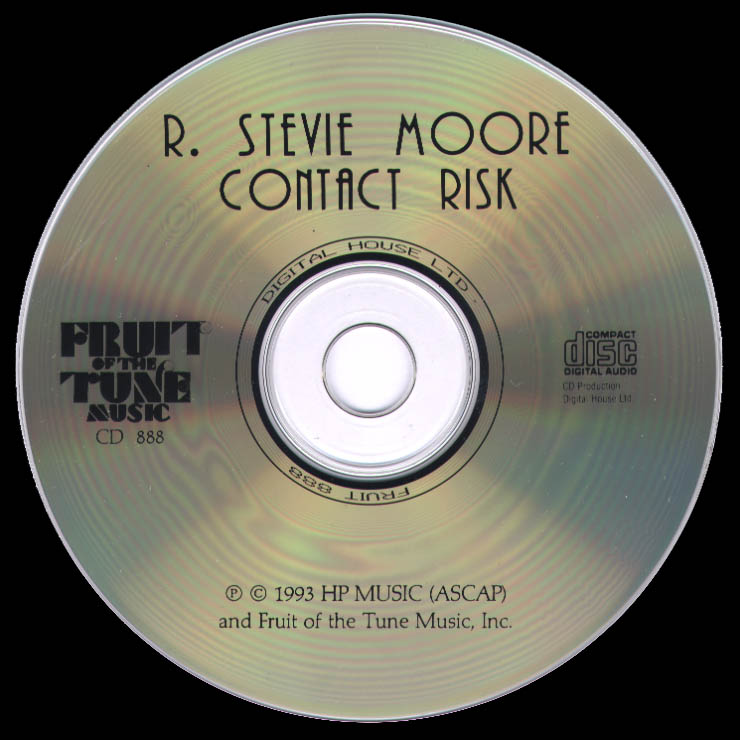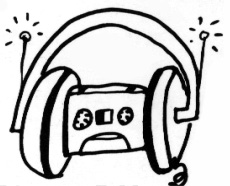
Originally reviewed for week ending 7/17/93
by
Paul Verna
New Jersey-based screwball whose
home
recordings have spawned a
cottage industry
of cassette
collectors compiles his first
CD
release. The sponge-like
artist absorbs
styles from A to Z and
squeezes them into
a lunatic musical
stock that veers from
avant-garde
sonic experiments to three-
minute
songs that, in a parallel universe,
are
classics. On this planet, though,
Moore"s
music remains attainable only
to those with
a taste for the zany,
unpredictable, and
unclassifiable.
Contact: (201)746-0531.

BUCKETFULL OF BRAINS
London UK
July 1993
by Mick Dillingham
Like a skint and introverted version of Frank Zappa, the genius that is R. Stevie Moore has spent 25 years creating a massive pot pourri of musical works that consistently batter at the boundaries of his vast talent - all the while holding a rock'n'roll scalpel of wit and insight at the throat of the American dream. Themes of failure, inadequacy and injustice run through Moore's work, as year after year he struggled to pull his career above the lowest rung on the ladder. Bathed in critical acclaim, but unable to match his ecstatic press with more than the hardest core of Moore-monists, he finally stopped recording altogether at the start of the '90s. Bitterly resigned to his new role as archivist to his own tape library (numbering 200 strong), making each and every note available to fans via his self-run cassette club.
The irony that Zappa purportedly owns a copy from the original 100-copy run of R. Stevie's first album (now worth over £220) is made even more apparent when one considers that both men are uniquely important in the scheme of things and yet remain polarised at opposite ends of the financial spectrum. Even as blind fate is in the process of taking Zappa from us at the height of his popularity, that same fate has also robbed us of the ongoing creativity of Moore, through years of neglect and ill-deserved obscurity.
And yet, for Moore, it's still not too late. He may be down, and his optimism battered and bruised, but his fundamental belief in his own genius remains true and the tellingly entitled "Contact Risk" (his twelfth album and second CD) could easily see the beginning of a wider realisation of how valuable a commodity Moore really is.
Drawn from the whole of his archive, "Contact Risk" is a 21-track trip into the bewildering diversity of influences and thoughts that make Moore's talent so unique and vital. "Your Dancing Ears" is an out-take from his brilliant "Glad Music" albums, churning with galloping rhythms and scattering logical vocals, while "Under The Light" burns with a classic Moore melody, sputtering guitars and plaintive vocals. "Elation Damnation" is a perverse Country pisstake, Moore's vocals veering towards the unmusical, while guitars belch sarcastically in the face of record company stupidity. "You may very well be concerned, that your big investment pays off" drawls Moore, aiming at one of his favourite targets, "I come with a money back guarantee."
"Contact Risk" is a wonderful snapshot into the full range of Moore's vision, innovative, melodic, smart-assed, happy and sad. It is a captivating listen throughout. Moore's own two-line sleevenote says it all: "If you don't like this, I quit. Heck, try using headphones."
Knoxville News-Sentinel
Tennessee
SHOWTIME
Sun 1 Aug 1993
by Wayne Bledsoe
R. Stevie Moore surfaces from the musical underground
Listening to and looking at R. Stevie Moore's new CD, "Contact Risk" (Fruit Of The Tune), gives you the feeling you are witnessing a work from some artistically-deranged maniac. From the unfriendly-looking cover photographs, to the disc's ominous poetry and eclectic music, Moore seems particularly abnormal.
"I've been doing this for two decades, and I've never really approached it in a normal fashion," says Moore, in a phone call from his New Jersey home.
Normal?
Definitely not.
The son of Bob Moore, one of Nashville's top bass players during the '50s and '60s, R. Stevie Moore IS an underground legend. He has been championed by writers in Rolling Stone, The New York Times and the Trouser Press. Considered "The Father of the Home Taping Underground," Moore has released a stack of vinyl albums, a few CDs and more than 200 cassette tapes. Most of the material has been recorded at his home with low-fi tape machines. All of it is available through the R. Stevie Moore Cassette Club.
What sets Moore's music apart from the run-of-the-mill home taper (aside from a lot of experience) is his talent for tongue-in-cheek lyrics and his myriad of musical styles.
"Contact Risk" gathers songs from throughout Moore's oeuvre.
"When I put together this CD I did it for people who already knew me, which is sort of a joke, because not that many people do," says Moore. "I put stuff on this disc that wasn't already available on vinyl---of course the vinyl is not available at this time."
Moore, 41, actually made one of his first recordings at the age of 7 when he sang a duet with Jim Reeves. While Moore was in the thick of country music, he says he was a child of the '60s and spurned country music.
In the early '70s Moore began making home recordings and gave them to friends. At the encouragement of his uncle, Harry Palmer, who was in the pop music business, Moore moved to New Jersey. In 1976, Palmer helped Moore release his first album "Phonography." One of the disc's highlights was a version of "The Andy Griffith Show Theme" that sounds like it was recorded by Queen.
The record didn't sell much, but it did win good reviews. This was the age of do-it-yourself-punk and, although Moore was far from punk, he became a pioneer.
More releases followed in later years, but it was the cassette explosion that really fueled the Moore movement.
With a huge backlog of home tapes, Moore took out some ads and created the cassette club. Album releases on small French and British record labels helped spread the word.
"It's slowly, but surely evolved through the years," says Moore. "My main concern is to try to find the lunatics around the world who have enough interest and finances to build huge stacks of R. Stevie Moore tapes. And I certainly have those. I got one from Belgium the other day, a $60 order. First time order, too."
Moore says there are probably 1,000 Moore fanatics scattered over the globe.
Explaining Moore's appeal is not exactly easy. By all logic, Moore's music should be annoying at best. It's extremely low-fi. He's no Frank Sinatra in the singing department. However, he makes up for his limitations with his extreme creativity, fun, enthusiasm and musical knowledge.
Included on "Contact Risk" are instrumental snatches that harken back to John Lennon's sonic experiments; a country parody with Moore selling himself like a one-time television offer; a rambling and weird rap; some short new-agish instrumentals---minus the boredom factor; and some honest-to-goodness pretty songs. All this is laced with weird wit and a startingly old-fashioned lack of profanity.
One of the most fun cuts on "Contact Risk" is "Alecia," a sort of off-kilter British Invasion-sounding love song to a 10 year old girl. Showing enormous restraint, the narrator and Alecia wait until Alecia's 12th birthday to wed. The song is both hilarious, sort of pretty and unsettling.
Moore says the song is NOT based on any real incident.
"The guy singing could be 13," says Moore.
Moore says so many songs come out so fast that he doesn't have a lot of time to think about each one.
"It's like artistic suicide, because I'm prolific, but I also don't, like, weed out the best," says Moore. "Everything I've recorded is available and valid and presentable, even if it's bad or incomplete. I always try to embrace every style I can. That in itself can be suicidal, because I've always lacked a specific direction, which I love. I love so many kinds of music and feel that I'm able to approximate those kinds of music."
Moore has also branched out into making videotapes, which are also available through his cassette club.
While Moore allows he is a pioneer, every now and then he says he wonders if it's all worth it.
"I had cop out attitudes at times where I was just like 'Why am I doing this?' I've seen things come and go and I'm still at square one. I'm 41 years old and still waiting for a major breakthrough from the underground. Although the underground has been very good to me."
What would happen if Moore did rise to the surface and get signed by a major record label?
"I would love to go into a studio with an unlimited budget---having somebody pay up front," says Moore.
The imagination reels.
"Contact Risk" is available from the artist.
M O R E
R E V I E W S
|




